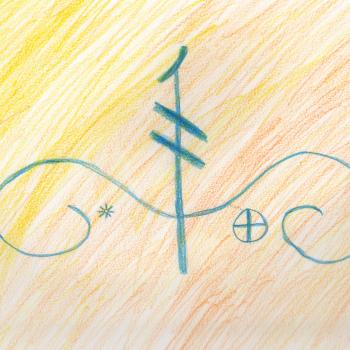On April 1st — April Fool’s Day — I did a live stream of music performance from my house, a sort of virtual house concert. Some years back it occurred to me that April Fool’s Day was a fine time to devote some consideration to The Fool from the Tarot, so I thought it would be appropriate to to say a few words on the topic during the show.
As I was retrieving the card from my Smith-Waite-Rider deck, I realized that the fact that it was between two other cards created a natural three-card reading: if The Fool is the present, then the adjacent cards would be the past and future.
And I believe the resulting reading offers us some insight into the moment.
The Past: Four of Pentacles
The Four of Pentacles shows a man holding on tight to what he has. In some contexts that may means security of possessions, inheritance, legacy; but what it brings to mind in this current moment is hoarding, and the greed and injustice that has set us up for the situation in which we find ourselves.
The Present: The Fool
Ah, the Sacred Fool. Not the sort of fool we see too often these days, the one thinks COVID-19 is a hoax, who pays no attention to social distancing precautions; but “a prince of the other world on his travels through this one,” as Waite wrote in his Pictoral Key to the Tarot. The Fool is the beginning and the end of the journey, standing at the precipice but with perfect faith that should he fall over, angels will lift him up.
There is a story about Bodhidharma, the mythical (and quite possibly entirely fictional) founder of Zen, meeting the Emperor of China. The Emperor told the Zen barbarian (Bodhidharma came from India, or maybe Persia) about all the good works he had done, sutras copied and stupas built and the like, probably expecting to be told how much merit he had accumulated, like reward points redeemable for a favorable birth in the next life. But the red-bearded barbarian wasn’t having it: he told the Emperor that it was useless, no merit, nothing was holy, all was empty.
The Emperor — who, let’s recall, could have had Bodhidharma tortured to death on a whim — got testy, and asked Bodhidharma “Who are you?” I’ve always taken that to have a subtext of “I am the Emperor, ruler of vast expanses of territory and millions of people. Who the hell are you to tell me what’s what, garbage monk?”
But Bodhidharma took the question as an inquiry into the nature of the self, and replied, “I don’t know”. Some Zen teachers say this is the most important statement in the whole tradition of Zen. (Bodhidharma then went off to meditate in a cave near the famous Shaolin Temple for several years, where another legend has him as the original kung fu master.)
Not even knowing who one is — that’s the Fool. Completely open and unattached. “I don’t know.”
(The Fool is given the number 0 in the Trumps, and as a C programmer from a long time back I love any 0-indexed array.)
The Future: Three of Wands
The Three of Wands shows, as Waite puts it, a “merchant prince” looking out over ships full of his merchandise, ready for commerce. So we have come around again to the material world of goods and possessions, but in a very different way than before. Rather than hoarding, we have the prosperity that comes from keeping the energy of commerce flowing. Waite writes that it is “as if the successful merchant prince were looking from his side towards yours with a view to help you” — certainly in this time of social distancing, someone looking to you from across a vast gulf has extra resonance.
Taken together, what these cards suggest a past mired in greed, in an attitude of hoarding and trying to hold fast to the energies of the world — out of fear — rather than letting them flow. But then the Fool reminds us to let go and trust, even at the very precipice, even not knowing what is to come next, even amidst the very greatest doubts.
I did a video about the reading:
If You Believe That You Are Defeated, You Already Are
I am reminded of a Twitter thread I saw recently that’s very relevant. Susana Polo / @NerdGerhl pointed out that J.R.R. Tolkien was an orphan who lived through World War I, the 1918 flu pandemic, and World War II — three terrible, horrible, world shaking extended disasters — and then went on to write The Lord of the Rings, a story of a terrible, horrible, world shaking extended disaster. Part of the disaster is the Black Shadow, the black despair that the Nazgul laid on the souls of mortal humans (and hobbits).
Nevertheless, in spite of the impossibility of the task and the fearsomeness of the foe — and in the case of Frodo and Sam and the other hobbit heroes, their own non-heroic, would-rather-be-having-second-breakfast natures — the heroes persisted.
As Polo tweeted,
“And the only reason everything works out in the end is because the heroes all choose to behave as if there was a chance for things to be all right, even if they had no evidence it would be.
“And if any of them had behaved as if there was no hope, there wouldn’t have been!
“Sam wouldn’t have rescued Frodo from the tower. Frodo would have just laid down in Mordor and died. Gandalf wouldn’t have orchestrated the victories at Minas Tirith or Helm’s Deep, and Aragorn wouldn’t have lead an army to the Black Gate to draw Sauron’s eye away from Mordor.
“Anyway, I’ve been thinking a lot about how that, specifically, is the story Tolkien thought was important to tell.”
If we accept the Way of the Fool, we can keep perfect hope even at the edge of the cliff, even in the depths of perfect doubt. (Doubt and hope are a yin and yang pair: opposites, yes, but mutually supporting and constantly transforming into each other.)
Or to put it in the language of the warrior path: if you believe that you are defeated, you already are. Sometimes it takes a Fool to keep fighting.
And sometimes it takes a Fool to stop the fighting, as when one of history’s great Fools, Emperor Joshua Norton, stood against an anti-Chinese pogrom in San Francisco in the 1860s with nothing but a prayer.
A Fool And His Money…
But if we can trust to the Sacred Fool rather than to the impulse to fear and hoarding, the results appear not only on some spiritual, rarefied realm but in the material realm of prosperous commerce. Because prosperity is a flow, not a holding on.
I’ve also been thinking lately of a ancient Shinto shrine I once visited. The Zeniarai Benten shrine’s full name is “Zeniarai Benzaiten Ugafuku Jinja – “coin washing shrine of Benzaiten / Ugafuku.” (Benzaiten is the Japanese version of the Hindu/Buddhist goddess Sarasvati, while Ugafuku is a Shinto deity of good fortune who became combined with her over the centuries.)
The shrine is named for a ritual performed there: each year hundreds of thousands of people come to this temple in Kamakura, the old capital outside Tokyo, to wash their cash in water from a sacred spring. It is believed that when this money is spent, it will come back to the spender many times over.
It doesn’t work if you hold on to the money — you have to spend it, a sort of magical economic stimulus plan.
A Fool and his money are soon parted. But that’s what you’re supposed to do with money, let it flow.


















